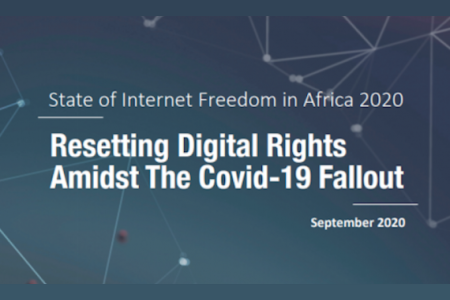
On September 29, 2020, the Collaboration on International ICT Policy for East and Southern Africa (CIPESA) released a new report, State of Internet Freedom in Africa 2020. The report focuses on the impact of the coronavirus disease (COVID-19) measures adopted by governments to contain its spread on digital rights and freedoms including freedom of expression and information, assembly and association, and the right to privacy.
This blog is cross posted from the Collaboration on International ICT Policy for East and Southern Africa (CIPESA) website where it was originally published. You may find the original post here.
On September 29, 2020, the Collaboration on International ICT Policy for East and Southern Africa (CIPESA) released a new report, State of Internet Freedom in Africa 2020. The report focuses on the impact of the coronavirus disease (Covid-19) measures adopted by governments to contain its spread on digital rights and freedoms including freedom of expression and information, assembly and association, and the right to privacy.
The report, which investigated the measures implemented by governments in Africa in fighting the Covid-19 pandemic shows that the highhandedness with which the governments and their agencies enforced the different Covid-19 preventive measures, including the suspension of rights through emergency declarations and the gagging of critical voices calling for transparency and accountability in handling the pandemic has greatly affected digital rights on the continent.
According to the report, prior to and during the pandemic period, several countries enacted retrogressive laws and implemented oppressive measures that served to strengthen the state’s repressive hand at the expense of citizens’ rights.
Onslaught on Freedom of Expression and Access to Information
Efforts to combat misinformation and disinformation related to Covid-19 had a direct effect on the enjoyment of the rights to freedom of expression and information. Whereas there were some bright spots, these were overshadowed by the negative.
Several governments enacted vague and overly broad laws and implemented repressive practices that curtailed freedom of expression and restricted access to information through censorship, filtering of content, closure of media houses, threats, arbitrary arrests, illegal detentions, prosecution, intimidation and harassment of journalists, online activists and bloggers.
Punitive sanctions and the criminalization of the work of media houses and journalists in countries such as Tanzania, Chad, Uganda, Nigeria, Niger, and Ethiopia, in effect gagged the media, and restricted the flow, quality and quantity of information available to journalists and the general public.
Invasion of Privacy and Personal Data Breaches
The fight against COVID-19 has been characterized by an assortment of measures that led to the violation of privacy in numerous countries. The new Covid-19 legislation as well as pre-existing laws that were cited in implementing pandemic-related emergency measures such as in Chad, Mauritius, Kenya, Uganda, South Africa and Zambia authorized the searching of homes and individuals, and required the reporting of individuals suspected to be carrying the virus.
Further, the laws required the collection of personal information of individuals, contact tracing and surveillance activity in countries like Burundi, Kenya, Nigeria, South Africa, and Tunisia, as well as mandatory testing in Zimbabwe. These measures mostly had the effect of undermining individuals’ data rights.
The infringement on individual privacy was aggravated by the absence of strong or recommended data protection safeguards in most of the affected countries. while some of the countries had laws on privacy and data protection, they did not offer strong protection but rather facilitated privacy invasion.
Accelerating Digital Exclusion
The report reveals that while Covid-19 has illuminated the centrality of technology in the lives of individuals and communities, it has also brought to the fore the glaring digital divide in the region, and indeed deepened the digital exclusion. Several individuals including persons with disabilities have been locked out of active participation in the digital society, with the exclusion being manifested in accessing education, remote work, and participating in democratic processes, among others. In some countries, internet costs remained very high while in others like Uganda, tax on social media continued to subsist. The high costs and taxes went to the root of affordability ICTs.
Undermining Citizen Participation
The report also demonstrates that the fight against Covid-19 has eroded the ability by citizens to participate in civic matters and the conduct of public affairs. Stringent measures including clamp down on media platforms, intimidation, arrests, detention and prosecution. These high-handed measures including in Algeria, Burundi, Egypt, Ethiopia, Kenya, Morocco, Rwanda, Tanzania, Uganda and Zimbabwe have cowed citizens, activists, and the media for fear of attracting reprisals. These measures have, in turn, forced human rights defenders, journalists, activists, the political opposition, and ordinary citizens to self-censor, disengage from participating in public affairs, and refrain from exercising their rights to participate.
Recommendations
The report calls upon governments, their agencies and authorities to drop all regressive measures that curtail digital rights and freedoms and instead adopt and undertake measures that promote the protection and enjoyment of digital rights and freedoms in the region.
Civil society organizations, telecommunication companies, and other stakeholders are called upon to work jointly towards ensuring that individuals realize and enjoy their rights and freedoms in the digital space by among others engaging in advocacy, developing policies that address individuals’ needs.
Find the report here.
- Log in to post comments